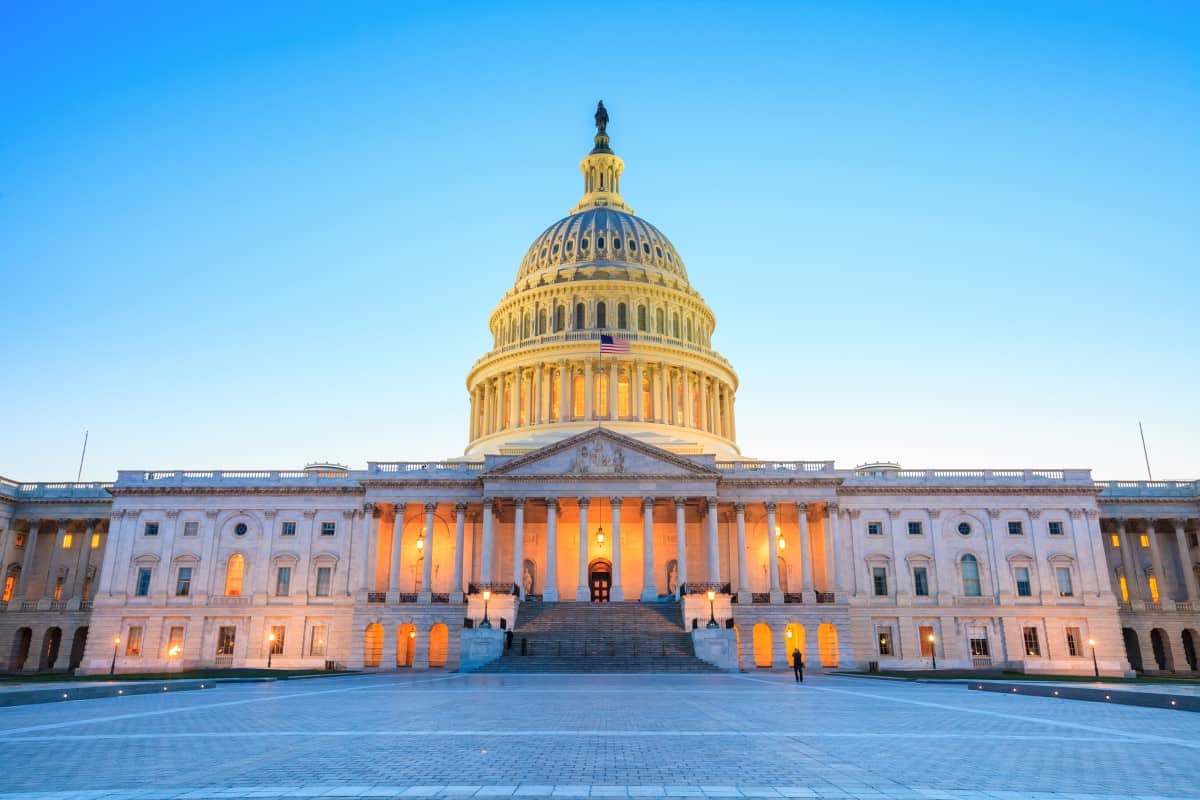Biden Set To Approve Landmark Social Security Shake-Up That Could Increase Benefits For Millions Of Retirees – Financial Freedom Countdown

In a dramatic midnight vote on December 21st, 2024, the Senate passed the Social Security Fairness Act, a controversial measure to boost retirement benefits for public sector workers.
On Monday, President Biden is expected to sign into law legislation extending additional benefits to nearly 3 million retirees.
Critics warn that the bill, which repeals provisions reducing payouts for pension recipients, could further destabilize Social Security’s already strained finances.
With overwhelming bipartisan support—76-20 in the Senate following a 327-75 House vote—the bill now lands on President Joe Biden’s desk on 6th January, 2025.
The bill aims to repeal two provisions, the Windfall Elimination Provision (WEP) and Government Pension Offset (GPO), which currently reduce Social Security payouts for public sector worker.
While hailed as a victory by many public employees and their unions, the move has sparked intense debate over equity, fiscal sustainability, and the future of Social Security.
Will This Reform Cost Retirees More Than It Helps?

The Social Security Fairness Act, estimated to cost the federal government $190 billion over the next decade, seeks to expand benefits for nearly 3 million retirees who opted into state or local pension plans instead of Social Security.
However, analysts at the bipartisan Committee for a Responsible Federal Budget (CRFB) argue that repealing WEP and GPO provisions will significantly worsen Social Security’s finances. The CRFB predicts the average couple retiring in 2033 could lose $8,000 in benefits during the half-year of early insolvency—and up to $400,000 in lifetime benefits if Social Security funds are depleted altogether.
The debate raises urgent questions about whether reforming these provisions serves justice or jeopardizes the long-term viability of the program.
The Case for Repeal of WEP and GPO

Supporters of the repeal argue that the WEP and GPO unjustly penalize public employees by reducing their Social Security benefits simply because they also receive pensions from jobs not covered by Social Security.
Proponents, including Representative Spanberger and Graves, highlight how these provisions disproportionately affect retirees who worked part-time or in second careers in Social Security-covered employment to supplement their public service incomes.
Senate Finally Passes the Bill

Senate Majority Leader Chuck Schumer told the rally organized by labor unions and lawmakers. “You’re going to find out which senators are with you, and which are against you. I’ve got all of my Democrats lined up to support it. What’s happening to you is unfair, it’s un-American and I will fight it all the way.”
Supporters emphasized that the repeal is not just about fairness for today’s retirees but also about correcting decades of systemic inequities for spouses, widows, and other survivors.
How Many People Benefit from the Repeal

The Windfall Elimination Provision (WEP) reduces Social Security benefits for individuals who previously worked in positions where they did not contribute to Social Security through payroll taxes but now receive pensions or disability benefits from those employers.
Approximately 2.1 million people — or about 3% of all Social Security beneficiaries — were impacted by the WEP, according to the Congressional Research Service.
The Government Pension Offset (GPO) decreases Social Security benefits for spouses, widows, and widowers who also collect pension payments.
As of December 2023, the GPO affected around 745,679 people — about 1% of all Social Security beneficiaries — according to the Congressional Research Service.
Critics Warn of Fiscal and Equity Concerns

Despite the momentum, not everyone is celebrating. Critics, including social policy analysts warn that outright repeal of the WEP and GPO could have significant consequences for the Social Security system and its beneficiaries.
Opponents argues that these provisions exist to ensure fairness between workers who pay Social Security taxes throughout their careers and those who work in non-covered employment.
Without the WEP and GPO, public employees with government pensions could receive disproportionately generous benefits compared to their Social Security-covered counterparts.
For instance, a public worker receiving a substantial pension from non-covered employment could appear as a low earner in the Social Security system and qualify for higher benefits than their actual income justifies.

Critics also warn that repealing these provisions would accelerate Social Security’s financial troubles, advancing the trust fund’s depletion date from 2035 to 2034 and adding $150 billion to its costs over the next decade.
As per the latest Trustees’ report, Social Security is projected to be insolvent in the coming decade.
Increased Criticism of the Bill

Congressman Chip Roy (Texas) in a post on X said, “This bill is absurd – and bankrupts Social Security 6 months earlier.”
Kurt Couchman, a former House staffer posted, “Senators just voted 73-27 to take up a bill to spend an extra $200 billion from the Social Security trust fund, forcing it to run out half a year sooner, which will impose even steeper cuts on all beneficiaries. Why? To give windfalls to retired government employees.”
The Wall Street Journal Editorial Board mentions, “What’s unfair is rewarding high-paid government workers with larger Social Security benefits than they earned. That’s essentially what the bill would do.
Social Security payments are based on worker contributions and average monthly earnings over the highest 35 years of compensation. They are also progressively indexed so higher-paid workers receive a benefit that replaces a smaller share of their earnings. Ergo, an investment banker receives a smaller wage replacement rate than a retail clerk.
But what about teachers and firefighters? Many state and local government employees who receive pensions don’t pay into Social Security. Instead they earn pensions that are far more generous than the average Social Security benefit. Many can also retire as early as 50 and then work in private industry while receiving their government pension.
Here’s the rub: Government workers who spend some of their career in private industry are entitled to Social Security benefits. However, the standard Social Security formula treats years employed in government as if workers have zero earnings. This reduces their average earnings in the equation and thus increases their wage replacement rate.
As a result of this formula quirk, government workers who spend some years with private employers would get a relatively larger benefit than similar-earning workers who spend their entire careers in private industry. Congress in 1983 sought to fix this injustice with the Windfall Elimination Provision (WEP), which reduced benefits for such government workers.
Government unions have long pushed to repeal this provision as well as a 1977 law that ensures government workers don’t receive outsize spousal benefits under the Social Security formula.”

The Social Security Fairness Act would add an estimated $196 billion to deficits over the next decade, the non-partisan Congressional Budget Office has estimated.
The increasing deficit is causing concerns to most Americans.
President Trump has the difficult task of getting the deficit under control.
Compared to the national deficit of $67 billion for the same period last year (Oct 2023), our national deficit has increased by $191 billion.
The federal government has spent $257 billion more than it has collected in fiscal year (FY) 2025, resulting in a massive national deficit.
Alternatives to Repeal

Opponents of repeal advocate for reforms rather than abolition. Alternative proposals suggested a “proportional formula” that adjusts benefits based on a worker’s total covered and non-covered earnings. This approach could better align benefits with actual income levels while avoiding the financial strain of full repeal.
Few organizations have supported similar proportional approaches, emphasizing fairness and fiscal responsibility. Such reforms would leverage data now available to the Social Security Administration to calculate benefits more accurately.
Questions Raised on the Timing of the Bill

Some experts question the timing of the bill while the solvency of the Social Security system has not been addressed. Although this bill will provide public sector employees and union members additional retirement benefits, no bill has been proposed to shore up the balance of the Social Security Fund which is expected to be insolvent in the coming decade.
Analysts warn that failure to act could worsen Social Security’s looming insolvency crisis.
Retirees are already facing a 21% benefit cut in 2033. Passage of the bill could accelerate a larger cut even sooner.
The CRFB calculates the passage of the bill will result in an additional $25,000 of lifetime benefit cuts for a typical couple retiring in 2033.

The debate over the WEP and GPO highlights broader questions about Social Security’s solvency, equity, and the balance between honoring contributions and maintaining financial sustainability.
For public-sector employees, the Senate vote represents long-overdue recognition of their service.
For policymakers and analysts, it underscores the complexity of ensuring fairness within a system strained by demographic and economic pressures.
As the bill lands on President Biden’s desk. the broader implications for Social Security hangs in the balance. The outcome of this bill will likely shape the future of Social Security policy for decades to come.
Like Financial Freedom Countdown content? Be sure to follow us!
Treasury I Bond Rates Drop from 4.28% to 3.11% — But with a 1.2% Fixed Rate Locked for 30 Years, Is It Still a Smart Investment?

Inflation has become a significant concern. During the past three years of surging inflation, I bonds offered a safe and attractive investment option. However, with recent lower CPI numbers, the current composite rate for I bonds has dropped to 3.11%, a sharp decline from the enticing 9.62% annual rate available in May 2022 or even the 4.28% available for bonds purchased before October 31st. As rates decrease, investors are now considering whether it’s still worth buying Series I bonds.
Trump’s Second Term Could Shake Up Your Taxes in Surprising Ways – Here’s What to Expect

With former President Donald Trump reclaiming the White House after defeating Vice President Kamala Harris, taxpayers may soon feel the effects of his ambitious tax agenda. Trump introduced the Tax Cuts and Jobs Act (TCJA) in 2017, which lowered tax brackets, increased the standard deduction, and boosted the child tax credit. During his campaign, he teased even more aggressive tax cuts, including eliminating taxes on Social Security benefits and tips, and slashing corporate taxes further. One of the most likely tax proposals to become reality would be the extension of key provisions from Trump’s Tax Cuts and Jobs Act set to expire in 2025. Here are some of the TCJA provisions slated to expire next year if not extended.
Trump’s Second Term Could Shake Up Your Taxes in Surprising Ways – Here’s What to Expect
Discover 15 Smart Investments That Provide Monthly Passive Income

Are you dreaming of a steady passive income every month from your investments? It’s not just a fantasy for the wealthy—it’s attainable for anyone ready to explore their options. Whether you’re just starting out or seeking to diversify, learn how to establish a reliable monthly income stream from familiar choices to hidden opportunities.
Discover 15 Smart Investments That Provide Monthly Passive Income
Retire Abroad and Still Collect Social Security? Avoid These 9 Countries Where It’s Not Possible

Dreaming of retiring to a sun-drenched beach or a quaint village? Many Americans envision spending their golden years abroad, savoring the delights of new cultures and landscapes. However, an essential part of this dream hinges on the financial stability provided by Social Security benefits. Before packing your bags and bidding farewell, it’s crucial to know that not all countries play by the same rules when it comes to collecting these benefits overseas. Here are the nine countries where your dream of retiring abroad could hit a snag, as Social Security benefits don’t cross every border. Avoid living in these countries so your retirement plans don’t get lost in translation.
Retire Abroad and Still Collect Social Security? Avoid These 9 Countries Where It’s Not Possible

Did you find this article helpful? We’d love to hear your thoughts! Leave a comment with the box on the left-hand side of the screen and share your thoughts.
Also, do you want to stay up-to-date on our latest content?
1. Follow us by clicking the [+ Follow] button above,
2. Give the article a Thumbs Up on the top-left side of the screen.
3. And lastly, if you think this information would benefit your friends and family, don’t hesitate to share it with them!
![]()
John Dealbreuin came from a third world country to the US with only $1,000 not knowing anyone; guided by an immigrant dream. In 12 years, he achieved his retirement number.
He started Financial Freedom Countdown to help everyone think differently about their financial challenges and live their best lives. John resides in the San Francisco Bay Area enjoying nature trails and weight training.
Here are his recommended tools
Personal Capital: This is a free tool John uses to track his net worth on a regular basis and as a retirement planner. It also alerts him wrt hidden fees and has a budget tracker included.
Platforms like Yieldstreet provide investment options in art, legal, structured notes, venture capital, etc. They also have fixed-income portfolios spread across multiple asset classes with a single investment with low minimums of $10,000.




